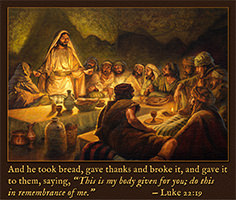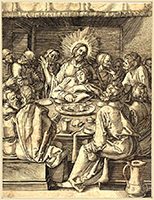First Corinthians 10:14–22 and 11:17–34 . . .
The Lord’s Supper — This is the second of a two-part study.
Classical “Last Supper” Works of Art
View 136 large masterpieces in Warren’s four award-winning Last Supper photo albums.
› Album #1 (33@): Includes Rosselli, El Greco, Rubens, Duccio, Bloch, Van Luyck, Nelli, Goltzius, Tissot, Vasari, Wierix, and more
› Album #2 (35@): Galle, Dürer, Wierix, Fra Angelico, Tintoretto, Lanfranco, Crivelli, Muller, Huret, Sassetta, Cranach, and more
› Album #3 (34@): Dürer, Bassano, Ricci, Titian, Vasari, Allori, Raphael, Fontebasso, Raimondi, Master Friedrich, Caspari, and more
› Album #4 (34@): Giotto, Leonardo da Vinci, Giotto, Veronese, Benjamin West, Tissot, Perugino, Lützelmann, Valentin, and more

“The Last Supper,” painting on poplar wood altarpiece, by Lorenzo Monaco, 1394–1395...*Enlarge image.
Week Two: 1 Corinthians 11:17–34
Did you know that Father God loves being our Dad? He cares about each of his children in the deepest way imaginable. But he becomes grieved when one of his children hurts another of his children. Worse yet is when one of his children, who’s been given much, dishonors one who has little. Today we’ll discover that God — our Abba Father —doesn’t tolerate divisions and distinctions within his church body. The reason is simple: God is dead-serious about his church body. In vv. 17-34, Paul provides three exhortations for us to follow.
1. Include the entire body of Christ in worship — vv. 17–22 (see this passage at the bottom of the page). In these first six verses, Paul rebukes the church at Corinth for being divided. In v. 17, he doesn’t praise them on account of their class divisions (see v. 18). Instead, he declares that they sadly “come together not for the better but for the worse.” He explains this problem further in vv. 18–19 when he tells the Corinthians that he cannot praise them, because instead of treating one another with brotherly love and acting as the family of God, there are divisions among them. His writing, “No doubt there have to be differences among you to show which of you have God’s approval” in v. 19 highlights a division between (a) those who have more than enough to eat and drink at the Lord’s Supper and (b) those who have insufficient quantities. This is evident from the contrast in vv. 21–22 between “one who remains hungry” and “one who gets drunk.”
To understand how the Corinthians are abusing the Lord’s Supper, realize that it was a part of the meal that early Christians shared together, a.k.a. the “love feast.” In Corinth, instead of sharing their food and drinks, each family brought its own, eating and drinking only what it had brought. The result was that the rich had plenty for themselves but the poor had little, while also suffering embarrassment. This was hardly the picture of Christian love and unity. They were eating their own private meals, rather than sharing a meal consecrated to the Lord. (Furthermore, some with plenty of wine to drink were evidently drinking too heavily.)
Grieved at the behavior of the church, Paul didn’t tolerate what was socially acceptable in ancient Corinth. He closes out v. 22 with a series of rhetorical questions, hoping to impress upon the body that, as a loving and impartial Father, God calls us to include all of His children in worship.
2. Recapture the significance of the Lord’s Supper (vv. 23–26) In four verses, Apostle Paul gives a brief theology of the Lord’s Supper, reminding us to remember that the Lord’s Supper pictures Christ’s self-sacrifice on behalf of His people. Twice in these verses, Paul urges the Corinthians to remember the death of Christ. By partaking of the bread and the cup, we remember that Jesus Christ took our hell that we might have his heaven. Our loving and impartial Father wants us to remember and proclaim the great sacrifice of his Son.
3. Judge yourself to avoid God’s judgment (vv. 27–32) Here, we and the Corinthians are warned against abusing the Lord’s Supper. Our sin and theirs, for which divine discipline is imposed, relates to the manner in which the Lord’s Supper is observed.
Paul applies the general truths of vv. 27–29, specifically to the situation at Corinth. In v. 30, Paul writes, “That is why many among you are weak and sick, and a number of you have fallen asleep.” The judgment here is physical yet progressive: weakness, sickness, death. The word “weak” refers to illness (e.g., depression, anxiety, etc.) while “sick” refers to weakness and on-going poor health. The verb “fallen asleep” refers to the death of a believer. While Paul deals here with illness as a physical divine judgment, not all illnesses are the result of sin in a believer’s life. These verses apply only if and when the problems of weakness, sickness, and death are problems resulting from divine discipline as a result of unconfessed sin.
Paul continues his argument in vv. 31–32 with two powerful truths: (1) “But if we were more discerning with regard to ourselves, we would not come under such judgment” (v. 31) and (2) “. . . when we are judged in this way by the Lord, we are being disciplined so that we will not be finally condemned with the world” (v. 32). In effect, the two verses boil down to this: Our goal must be to judge the sin in our own lives before God has to expose it; and the goal of God’s ongoing discipline — not his punishment — is remedial.
The proper course of action for the Corinthians and us should be to honor and respect fellow believers (vv. 33–34). Paul concludes this passage in this context: He’s likely instructing the Corinthians to receive each other as equal members of the body of Christ. The command to “eat at home” connects to Paul’s first warning that the Corinthians are worse off for having gathered together (v. 17). If they intend to only indulge their appetites, then they should stay at home. But if the church’s gathering together is to be meaningful, it must become an expression of genuine fellowship, which includes sharing.
Paul’s words in Romans 12:10 sum up this entire passage: “Be devoted to one another in love. Honor one another above yourselves.”
Note: 1st Corinthians challenges believers to examine every aspect of their lives through the lens of the Gospel. In chapters 11–14, Paul presents these four challenges:
Covering the head in worship (ch. 11) | Concerning spiritual gifts (ch. 12)
The supremacy of love (ch. 13) | Intelligibility in worship (ch. 14)
› Watch BibleProject’s superb animated video (2 minutes) that highlights Paul’s messages in these four chapters.
† Summary of 1 Corinthians 11:17–34
This passage addresses issues with the Lord’s Supper in the Corinthian church. Here’s my summary of its key points:
• Divisions in the Church
Paul criticizes the Corinthians for their divisive behavior during their gatherings, particularly during the Lord’s Supper.

“The Last Supper,” oil on canvas, painted by Florentine nun Plautilla Nelli, 1550s...*Enlarge image.
• Abuse of the Lord’s Supper
The Corinthians were mishandling the sacred meal:
† Some were eating and drinking excessively.
† Others were going hungry.
† This behavior reflected and reinforced social inequalities.
• The Tradition of the Lord’s Supper
Paul reminds the Corinthians of the true meaning and practice of the Lord’s Supper:
† It commemorates Christ’s death.
† The bread represents Christ’s body.
† The cup represents the new covenant in Christ’s blood.
† Participants should examine themselves before partaking.
• Consequences of Improper Participation
Paul warns that partaking unworthily can lead to judgment:
† Some have become weak, ill, and have died.
† Self-examination is crucial to avoid judgment.
• Call for Unity and Proper Observance
Finally, Paul instructs the Corinthians to:
† Wait for one another before eating.
† Eat at home if hungry.
† Gather to share the meal in a unified manner.
This passage emphasizes the importance of unity, equality, and reverence in observing the Lord’s Supper, challenging the Corinthians to align their practice with the meal’s true meaning and purpose.
- Q. 1 When has the Lord’s Supper been particularly meaningful to you?
- Q. 2 In v. 20, Paul says, “. . . it is not the Lord’s Supper you eat.” Why is this so?
- Q. 3 Is it your practice to “examine yourself” before coming to the table? How might you go about doing that?
1 Corinthians 11:17–34
New International Version (NIV)
[You can view it in a different version by clicking here; you can also listen to chapter 11.]
Correcting an Abuse of the Lord’s Supper
... gospelimages.com

Click to enlarge and download this
superb “Last Supper” painting
from Luke 22:19.
17In the following directives I have no praise for you, for your meetings do more harm than good. 18In the first place, I hear that when you come together as a church, there are divisions among you, and to some extent I believe it. 19No doubt there have to be differences among you to show which of you have God’s approval. 20So then, when you come together, it is not the Lord’s Supper you eat, 21for when you are eating, some of you go ahead with your own private suppers. As a result, one person remains hungry and another gets drunk. 22Don’t you have homes to eat and drink in? Or do you despise the church of God by humiliating those who have nothing? What shall I say to you? Shall I praise you? Certainly not in this matter!
23For I received from the Lord what I also passed on to you: The Lord Jesus, on the night he was betrayed, took bread, 24and when he had given thanks, he broke it and said, “This is my body, which is for you; do this in remembrance of me.” 25In the same way, after supper he took the cup, saying, “This cup is the new covenant in my blood; do this, whenever you drink it, in remembrance of me.” 26For whenever you eat this bread and drink this cup, you proclaim the Lord’s death until he comes.
27So then, whoever eats the bread or drinks the cup of the Lord in an unworthy manner will be guilty of sinning against the body and blood of the Lord. 28Everyone ought to examine themselves before they eat of the bread and drink from the cup. 29For those who eat and drink without discerning the body of Christ eat and drink judgment on themselves. 30That is why many among you are weak and sick, and a number of you have fallen asleep. 31But if we were more discerning with regard to ourselves, we would not come under such judgment. 32Nevertheless, when we are judged in this way by the Lord, we are being disciplined so that we will not be finally condemned with the world.
33So then, my brothers and sisters, when you gather to eat, you should all eat together. 34Anyone who is hungry should eat something at home, so that when you meet together it may not result in judgment.
And when I come I will give further directions.
